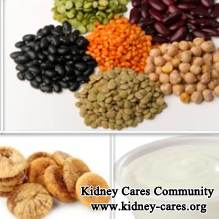 Search
Search
 Search
Search
 Potassium is an essential mineral and helps all organs, body tissues, and cells to function properly. The mineral also helps to regulate the water balance in and outside each cells, along with sodium. It plays an important role in muscle growth and contraction, nerve cell function and protein synthesis. However, for nephrotic syndrome(NS) patients, they should restrict the potassium intake. Why? Here we will tell the reason.
Potassium is an essential mineral and helps all organs, body tissues, and cells to function properly. The mineral also helps to regulate the water balance in and outside each cells, along with sodium. It plays an important role in muscle growth and contraction, nerve cell function and protein synthesis. However, for nephrotic syndrome(NS) patients, they should restrict the potassium intake. Why? Here we will tell the reason.
The role of potassium in our human health
1. Improve bone health
Some studies have shown that having a proper level in one’s diet can improve bone health and also prevent conditions like osteoporosis.
2. Cardiovascular health
Potassium seems to lower the risk of heart disease and stroke.
Potassium and kidney disease
Kidney is an important blood purifier in our body and responsible for filtering metabolic wastes and toxins in order to provide a relatively clean internal environment for the body’s normal circulation. Besides, kidneys also work to keep balance electrolytes. Once kidney is damaged, this function is severely damaged, and it is more usual to have elevated levels of potassium, called hyperkalemia, as excessive amounts cannot be removed by the kidneys and excreted through urine. A decrease in renal efficiency with age combined with certain medications, such as non-steroidal anti-inflammatory drugs, can also lead to a build up of the mineral.
Nephrotic syndrome patients have declined kidney function, and they always have an elevated potassium level. A high level of potassium in your body make lead to many life-threatening diseases such as irregular heartbeat, heart failure, heart attack and stroke. Occasionally, these life-threatening diseases kill patients more faster than nephrotic syndrome itself. This is also the reason why nephrotic syndrome patients need to restrict potassium intake. Foods and vegetables rich in potassium should be avoided such as bananas, tomatoes, potatoes, dried fruits and avocados as well as beans and legume.